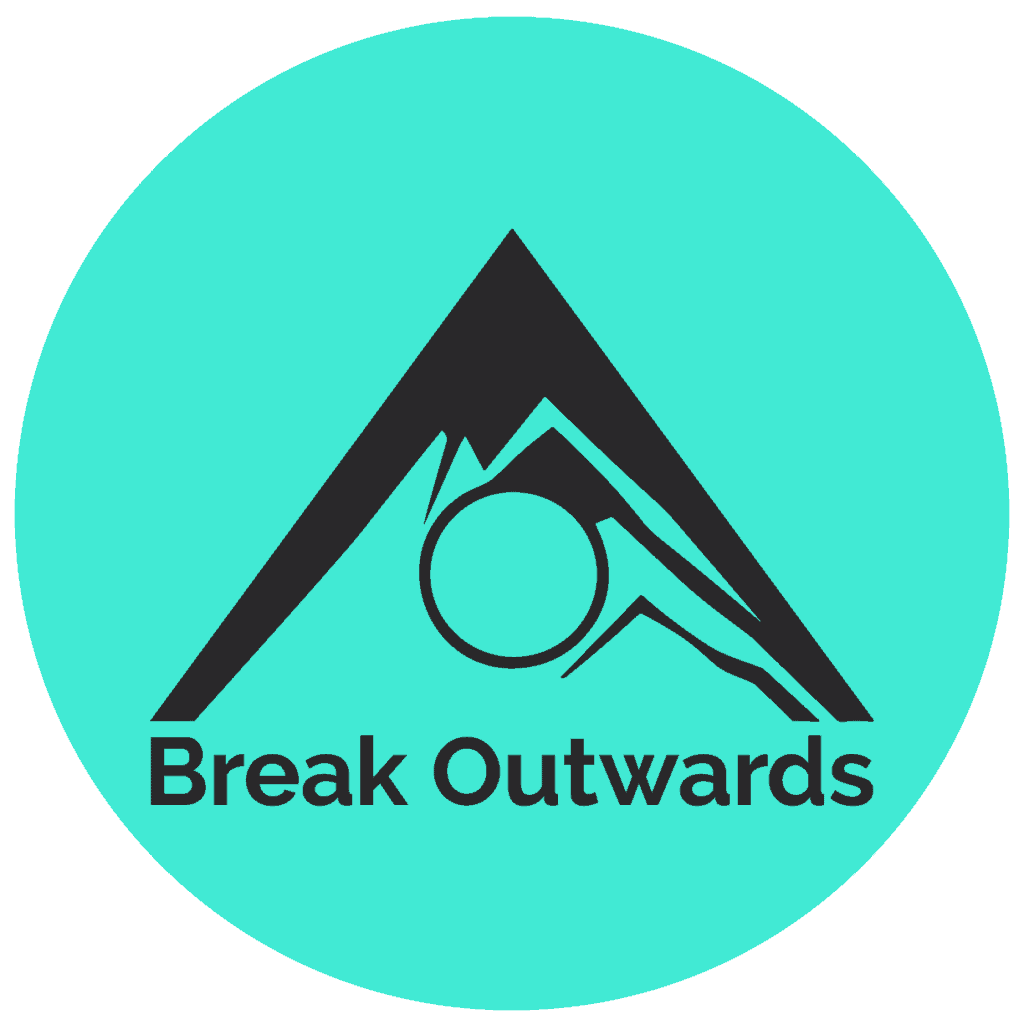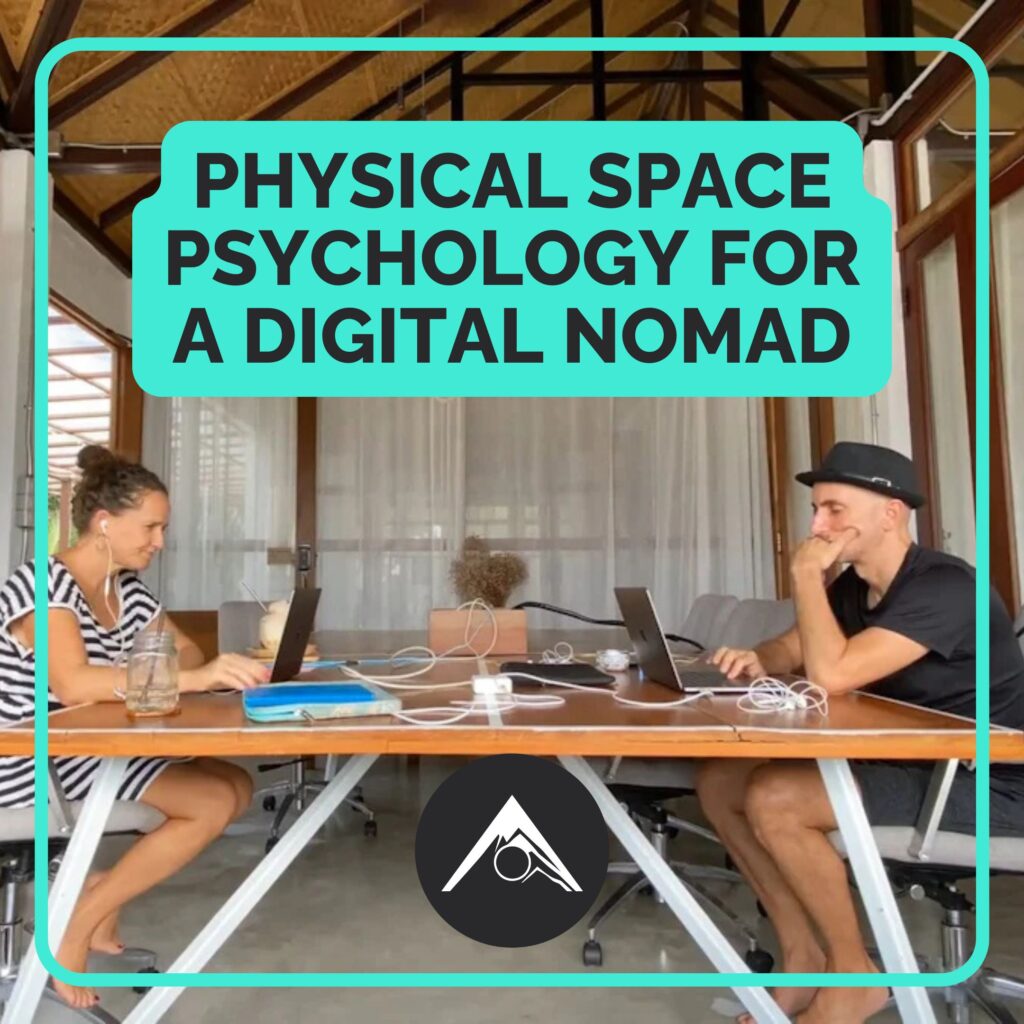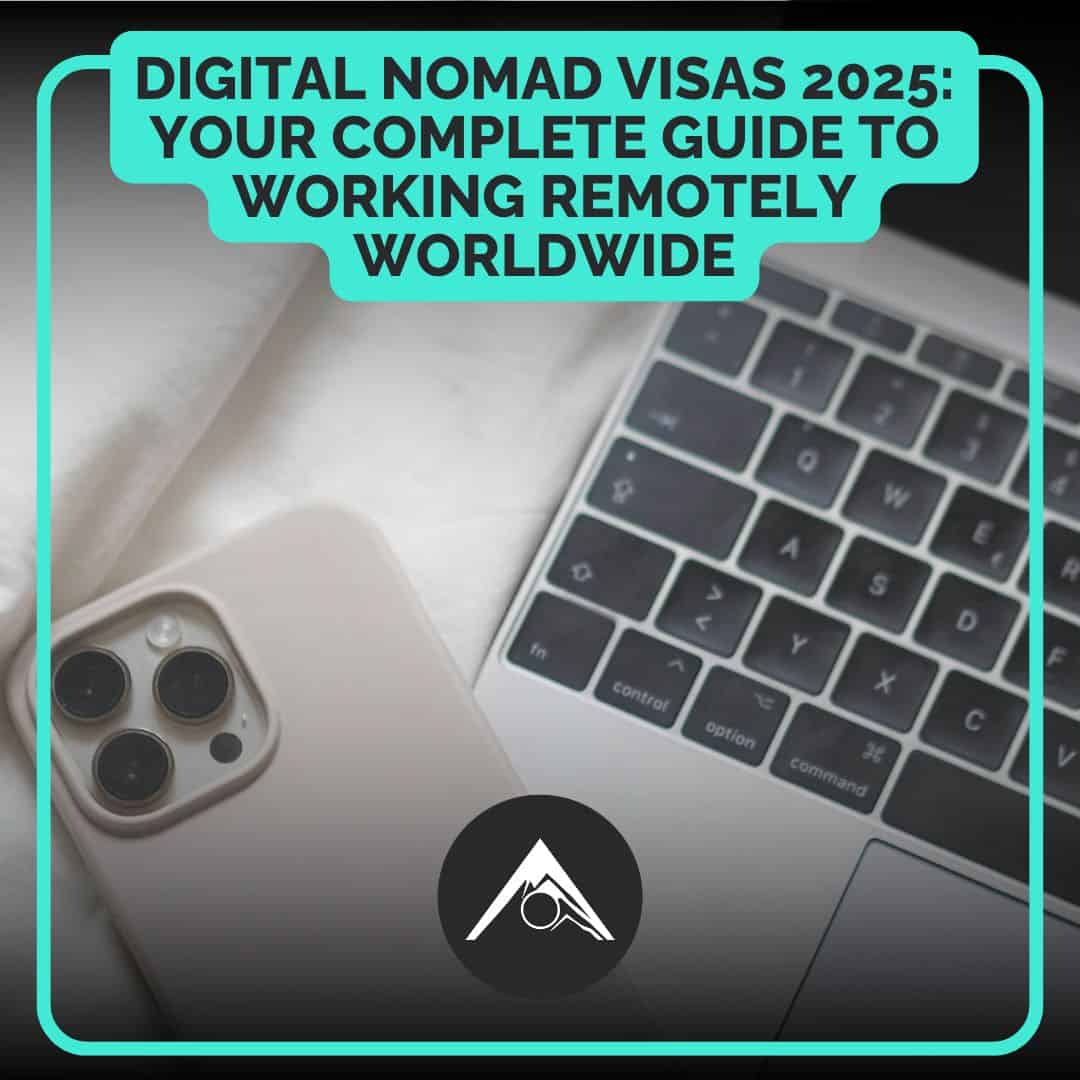Physical Space Psychology for a Digital Nomad

Your physical environment plays a huge role in shaping your mental well-being, especially when you’re constantly on the move. As a digital nomad, you might find it thrilling to embrace the adventure of new destinations, but the transient lifestyle comes with its own set of challenges. Frequent travel can blur the lines between work and personal life, making it hard to maintain balance. You may struggle with unreliable internet, shifting time zones, or even feelings of loneliness. These hurdles can take a toll on your productivity and emotional health.
So, how can you create spaces that support your well-being and help you thrive? By understanding digital nomad workspace psychology and prioritizing self-care and personal space, you can design environments that enhance focus, creativity, and connection.
Key Takeaways
- The space around you affects how you feel mentally. Keep your work area tidy and planned to stay focused and calm.
- Use small habits to add routine to your moving lifestyle. Easy things, like drinking coffee or meditating, can make life feel steady.
- Decorate short-term spaces with special items and nice smells. This makes it feel like home and helps with loneliness.
- Spend time with other digital nomads in shared workspaces. Making friends can help you feel less alone and work better together.
- Stay mindful to feel balanced in new places. Writing in a journal or meditating can help you handle constant changes.
Digital Nomad Workspace Psychology

What Is Physical Space Psychology?
Have you ever noticed how your surroundings can affect your mood or energy levels? That’s physical space psychology in action. It’s the study of how your environment influences your thoughts, emotions, and behaviors. For digital nomads like you, this concept becomes even more important. You’re constantly moving between places, which means your workspace changes just as often.
Physical space psychology helps you understand how to design spaces that support your well-being and productivity. Whether you’re working from a cozy café in Paris or a bustling co-working space in Bali, the way you set up your environment can make or break your day. It’s not just about aesthetics. It’s about creating a space that fuels your creativity and helps you stay focused, no matter where you are.
Why It Matters for Digital Nomads
The link between environment and mental health.
Your environment has a direct impact on your mental health. As a digital nomad, you might feel overwhelmed by the constant change that comes with travel. A cluttered or chaotic space can add to that stress, making it harder to focus or relax. On the flip side, a well-organized and intentional workspace can help you feel grounded. It creates a sense of stability, even when you’re far from home.
How physical spaces influence focus, creativity, and emotional balance.
The right space can do wonders for your focus and creativity. Imagine trying to work in a noisy, dimly lit room. It’s tough, right? Now picture a bright, quiet space with a comfortable chair and a view of the ocean. That’s the power of physical space psychology. By designing your workspace with intention, you can boost your emotional balance and set yourself up for success. This is especially important if you’re juggling the best digital nomad jobs, where productivity and growth are key.
Your workspace isn’t just a place to get things done. It’s a tool for enhancing your well-being and thriving in the world of digital nomadism.
Challenges of the Digital Nomad Lifestyle
The Psychology of Not Having a Home Base
The mental toll of transient living.
Living without a permanent home can feel liberating at first. You get to explore new places, embrace flexibility, and chase the adventure of digital nomadism. But over time, the constant movement can take a toll on your well-being. Without a home base, you might feel unanchored or disconnected. The lack of stability can lead to stress, anxiety, or even burnout. It’s hard to feel grounded when your surroundings are always changing.
Struggles with creating routines and stability.
Routines are essential for maintaining balance, but they’re tricky to establish when you’re always on the go. One week, you’re working from a beachside café; the next, you’re in a bustling city. This inconsistency can disrupt your productivity and make it harder to stick to healthy habits. Finding ways to create small rituals, like a morning coffee routine or a dedicated workspace, can help you regain a sense of stability.
Finding Love on the Road
Balancing personal relationships with a nomadic lifestyle.
Navigating love as a digital nomad comes with unique challenges. The transient nature of your lifestyle can make forming deep, meaningful relationships difficult. Constant travel often means leaving behind friends, family, or romantic partners. This distance can strain communication and trust, two pillars of healthy relationships. Celebrating milestones or offering emotional support becomes harder when you’re physically apart.
The role of physical space in fostering connection.
Physical space plays a surprising role in maintaining romance and connection. Whether it’s carving out time for video calls or creating a cozy corner for shared moments, intentional spaces can strengthen relationships. Shared environments, like co-working spaces or digital nomad meetups, can also help you build a sense of community and connection while balancing love and adventure.
Impact on Productivity and Focus
Adapting to distractions in unfamiliar environments.
Unfamiliar environments can be full of distractions. From noisy cafés to unpredictable Wi-Fi, staying focused can feel like an uphill battle. Incorporating mindfulness practices, like meditation or yoga, can help you stay centered. Regular exercise and a balanced diet also improve concentration, making it easier to adapt to new surroundings.
Managing time zones and workspace variability.
Time zones and workspace changes add another layer of complexity. A dedicated workspace, even if temporary, can boost efficiency. Using tools like planners or apps helps you manage your schedule and minimize distractions. By staying organized, you can maintain productivity no matter where your travels take you.
Strategies for Optimizing Physical Spaces

Designing Portable Rituals
Establish consistent routines for work and leisure.
Creating consistency in your day-to-day life as a digital nomad can feel like a challenge, but portable rituals can help. These small, repeatable actions bring structure to your day, no matter where you are. For example:
- Set aside specific times for meditation or mindfulness practices. Use reminders to stay on track.
- Protect your meditation or leisure time by setting clear boundaries for work and exploration.
- Schedule these rituals into your daily itinerary as non-negotiable moments of self-care.
These routines not only help you stay grounded but also improve your overall well-being. Whether it’s a morning coffee ritual or a quick evening walk, these habits create a sense of normalcy in your ever-changing adventure.
Use portable tools like planners, apps, or travel-friendly items.
Portable tools make it easier to stick to your routines. A compact planner or a productivity app can help you organize your day and track your goals. Travel-friendly items, like a foldable yoga mat or noise-canceling headphones, can transform any space into your personal sanctuary. These tools keep you focused and connected to your priorities, even when you’re on the move.
Personalizing Temporary Spaces
Add meaningful items like photos or small decor.
Personalizing your temporary spaces can make them feel more like home. Bring along items that hold personal significance, like a favorite photo or a small piece of decor. These objects create a sense of familiarity and belonging, which combats loneliness and fosters connection. They act as a safety net, grounding you emotionally while you explore new places.
Use lighting, scents, and music to create familiarity.
Simple sensory elements can transform a space. Warm lighting, a familiar scent, or your favorite playlist can instantly make a room feel more inviting. These small touches not only enhance your mood but also provide a sense of stability. They remind you of the comforts of home, even when you’re far away.
Leveraging Design Principles
Arrange spaces to minimize distractions and maximize comfort.
When setting up your workspace, focus on functionality and privacy. A functional setup ensures you have the tools you need, while privacy helps you stay focused. For example:
| Principle | Description |
|---|---|
| Functionality | Ensure your workspace has the necessary tools for your tasks. |
| Privacy | Create a quiet area for focused work, even if it’s just a corner of a room. |
These principles help you create a productive environment, no matter where you travel.
Incorporate ergonomic and travel-friendly furniture.
Ergonomic furniture is a game-changer for digital nomads. Portable standing desks, adjustable laptop stands, and foldable keyboards are lightweight and easy to carry. They reduce strain on your body, keeping you comfortable during long work sessions. Ergonomic travel mice also prevent wrist discomfort, making them essential for maintaining your well-being on the road.
Creating a Sense of Community
Engage with the digital nomad community in co-working spaces.
As a digital nomad, finding a sense of belonging can feel tricky when you’re always on the move. Co-working spaces offer a fantastic way to connect with like-minded individuals while staying productive. These spaces aren’t just about work—they’re about building a support network that makes your journey less isolating.
Many co-working spaces host regular events, like workshops or networking meetups, where you can meet people from diverse backgrounds. Shared meals or coffee breaks often create a familial atmosphere, helping you feel more at home. These interactions can combat loneliness and provide meaningful connections that enrich your travel experience.
Co-working spaces also foster collaboration. You’ll find people from various industries, which opens up opportunities to brainstorm, share ideas, and even grow your business. Whether you’re discussing strategies with a fellow entrepreneur or attending a group session, these spaces encourage creativity and personal growth.
Use shared environments to foster social connections.
Shared environments, like co-living spaces or digital nomad meetups, are perfect for building a strong support network. They bring together people who understand the challenges of this lifestyle. You’ll find a community that supports you emotionally and professionally.
Engaging with others in these settings has psychological benefits too. It helps you combat feelings of isolation and fosters a sense of belonging. Sharing experiences with others can increase your self-awareness and even boost your resilience. Living abroad and adapting to new environments often leads to personal growth, as you rebuild your identity in positive ways.
These shared spaces also spark creativity. Group activities, brainstorming sessions, or casual conversations can inspire fresh ideas. Plus, meeting people from different cultures fosters empathy and open-mindedness. You’ll not only expand your support network but also gain a deeper appreciation for the adventure of travel and the love for human connection.
The Role of Mindfulness and Intentionality
Adapting to New Environments
Practice mindfulness to stay present and grounded.
Adapting to new environments can feel overwhelming, especially when you’re constantly on the move. Mindfulness can help you stay grounded and present, no matter where your travels take you. Here are some effective practices to incorporate into your routine:
- Use meditation as a compass to navigate the chaos of new surroundings.
- Infuse mindfulness into every step of your journey, from packing to exploring.
- Reflect on your experiences in a travel journal to build mental flexibility.
- Embrace local customs as part of your meditation practice.
- Engage in yoga or mindful exploration to maintain your mental health.
These practices reduce stress and enhance focus, helping you feel more connected to your surroundings. Deep breathing exercises can also calm your nervous system, making transitions smoother.
Use journaling or meditation to process transitions.
Journaling and meditation are powerful tools for processing the emotional ups and downs of a nomadic lifestyle. Writing in a journal helps you clarify your thoughts and reflect on your experiences. It’s a great way to cultivate gratitude and self-awareness. Meditation, on the other hand, fosters emotional resilience and inner peace. Together, these practices can help you navigate the challenges of constant change with ease.
Setting Intentions for Each Space
Define the purpose of each area (e.g., work, rest, socializing).
Every space you occupy serves a purpose. Defining that purpose can help you stay focused and balanced. For example, set up a dedicated workspace to boost productivity. Create boundaries between work and leisure to maintain a healthy lifestyle. If you’re in a shared environment, use it to foster community connections and enrich your experience.
Align physical space with mental and emotional goals.
Your physical space should reflect your mental and emotional needs. Carve out areas that align with your goals, whether it’s a cozy corner for relaxation or a quiet nook for focused work. Listening to your body’s signals can guide you in creating spaces that promote well-being. Clear boundaries between professional and personal activities prevent burnout and help you maintain a sustainable lifestyle.
By being intentional with your spaces, you can create an environment that supports both your work and your love for adventure.
Your physical space plays a huge role in shaping your mental health and productivity as a digital nomad. By designing intentional environments, you can create a sense of stability and focus, even when your travels take you to unfamiliar places. Whether it’s personalizing a temporary room or building portable rituals, these small changes can make a big difference.
Experiment with different strategies to find what works best for your lifestyle. Every journey is unique, and so is your approach to creating balance. Remember, thriving as a digital nomad starts with prioritizing your well-being. When you manage your space thoughtfully, you’ll unlock the freedom to embrace every adventure with confidence.
FAQ
How can I maintain productivity while traveling?
Create a dedicated workspace wherever you go. Use portable tools like planners and apps to stay organized. Establish routines that fit your travel schedule. These strategies help you maintain focus and productivity, even in new environments.
What are some tips for personalizing temporary spaces?
Bring along small items that hold personal significance, like photos or decor. Use lighting, scents, and music to create a familiar atmosphere. These touches make any space feel more like home, enhancing your comfort and emotional well-being.
How do I balance work and leisure during my travels?
Set clear boundaries between work and leisure time. Schedule breaks and leisure activities just like work tasks. This balance ensures you enjoy your travel adventures while staying productive and focused on your goals.
How can I connect with others while on the road?
Engage with the digital nomad community in co-working spaces. Attend local events or meetups. These interactions help you build a support network, fostering social connections and enriching your travel experience.
What role does mindfulness play in adapting to new environments?
Mindfulness helps you stay present and grounded. Practice meditation or journaling to process transitions. These practices reduce stress and enhance focus, making it easier to adapt to new travel environments.










